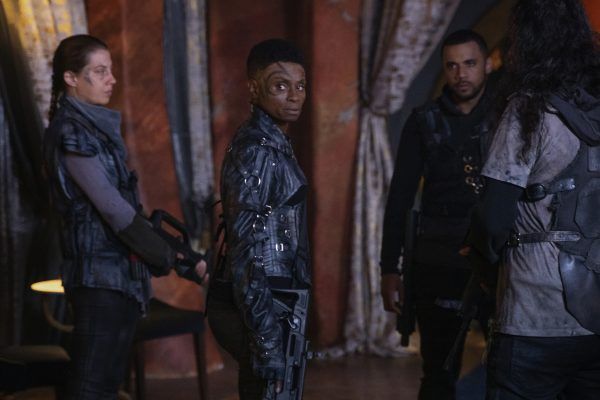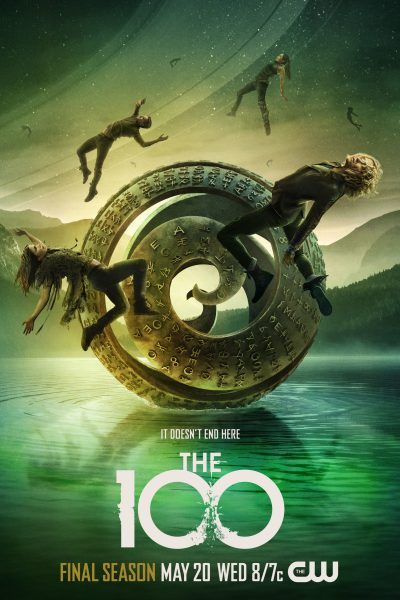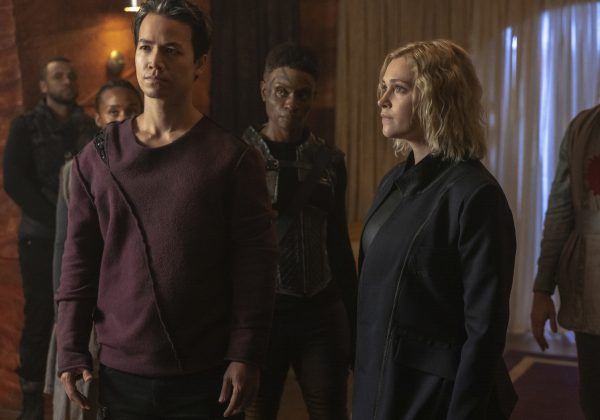It’s hard to believe it all began with a bunch of hot teens and twentysomethings crash-landing on Earth to the dulcet sounds of Imagine Dragons. For the last six seasons, The CW’s high-concept sci-fi survival series The 100 defied expectations every step of the journey, quickly dropping the pop songs in favor of epic scores (though of course the teens and twentysomethings stayed hot, as is the CW way,) sending its characters through several apocalypses, and fearlessly tearing through the ensemble cast with a knack for heart-wrenching deaths and character betrayals to rival Game of Thrones. Now, with one last season to bring it all home — and bring the series to a fitting if a bit cutesy 100 episodes — The 100 leans all-in on the sci-fi trappings for one last breathless, break-neck paced adventure.
If you need a quick recap, Season 7 picks up after one of the biggest cliffhangers yet. Which is to say, what the heck just happened to Octavia and Bellamy, what the heck is the anomaly, and what the heck is Clarke gonna do about the mess on Sanctum? Oh, and where did that pesky warlord Sheiheda upload to after the Flame was extinguished? In the first four episodes of Season 7 provided to the press, some of these questions are answered outright, some answers are teased, and some are clearly the mysteries around which the season will be framed. But what’s abundantly clear is that, in The 100 tradition, none of the answers are easy.
The sixth season also marked a major change in the arc of our core characters. Sure, The 100 has had no shortage of devastating character deaths before, but by finally killing off Kane and Abby for good, the series lit the fuse on a thematic evolution they’ve been building towards for seasons. Because no matter how many impossible choices Clarke had to make in the previous seasons, no matter how many triggers she pulled or levers she pushed, she always had her mother to fall back on. Her mother, a morally opaque and deadly determined woman in her own right, who was a core architect of the broken society in which Clarke and the rest of the 100 were raised. But now, those architects are dead and buried. Kane, Abbey, Jaha; the “parents” of the show are long-gone, leaving our heroes to step up and finally, fully become the architects of their own new society. Can they do better?
Season 7 gets off to a bit of a rocky start with a dialogue-heavy establishing episode that’s understandably focused on set-up but frustratingly inert until its final moments. Fortunately, from those last scenes of the premiere forward, The 100 Season 7 moves at a breathless clip, infusing world-building with tense action, a firm embrace of all the exciting possibilities sci-fi storytelling has to offer, and another batch of impossible odds for Clarke and Co. to overcome. The characters are trying to build a house of cards with a deck that’s already been set on fire, and in the pursuit of good drama, the writers relentlessly throw fuel on flare-ups that put the heroes to the test.
That includes some exciting new challenges for all the favorites, and more than any season in recent memory, Season 7 is quick to find a balance in the narrative for most of the core characters. Eliza Taylor’s performance as Clarke has anchored the series for the entire run, and as the character processes the death of her mother, Taylor gets to show off her range early and often. A special side shout-out also goes to the costume department, who has consistently redesigned the character's iconic lewks to match both her character journey and the new sci-fi subgenres in each season.
Elsewhere, oft-sidelined standouts like Lindsey Morgan’s Raven and Tasya Teles’ Echo finally get some well-deserved meaty material to work with, while regular scene-stealers Richard Harmon and Louisa D’Oliveira do what they do best as the wily wildcard lovebirds Murphy and Emori. Newcomer Shelby Flannery, who made quite an entrance in the Season 6 finale, continues to shine as Diyoa’s mysteriously aged-up daughter Hope. Flannery is a commanding performer and Hope is a curious character, and all that intrigue pays off when Hope is given one of the most fascinating and tightly-scripted origin stories in the entire series.
And because I know you’ll be wondering by now if you didn’t just outright scroll to find this answer; what of the beloved Blake siblings, Marie Avgeropoulos’ post-Blodreina Octavia and Bob Morley’s Bellamy? Their fates were left with a big ol’ question mark hanging over their heads at the end of last season, but sorry to tell ya, everything surrounding those mysteries is embargoed to filth, so my lips are sealed.
What I can say about Season 7 as a whole is that, more than ever, it’s not just Clarke who has to make the impossible choices. Every character is forced to pull their own personal lever of sorts, placed in a position where they have to make a snap survival judgment that puts their values to the test. Some of their choices may surprise you.
At the same time, The 100 continues to surprise and delight with the ambition of its genre storytelling. As always, it swings for the fences, bounding into a new sci-fi subgenre that once again reframes the mythology of the show. If there’s one legacy The 100 is guaranteed to leave behind no matter how the final season shakes out, it’s as a work that embraced the genre label rather than shying away from it. And, in doing so, found a way to constantly redefine itself with fearless pivots and big, bold swings.
I’ll admit, I was bummed to hear that The 100 would be ending so soon after the Season 5 finale changed the game and Season 6 never quite lived up to the potential of the journey to a new world. The Primes turned out to be yet another rival with whom our heroes could not find peace – just like the Grounders and Mountain Men before them – history repeated yet again, and it all boiled down to destroy or be destroyed. The 100 is always building itself compelling new worlds, but the characters keep making the same bad choices.
But with the now impending endgame in mind, the writing feels invigorated and sharpened. And it has to be, because this time they’re playing for keeps. The 100 has always prodded at moral grey areas and the seemingly impossible task of building a peaceful society. Have our heroes been refugees or colonists? Can the word "hero" even be appropriately used anymore in their cut-throat, do-or-die world? Who tells those stories, and how do the stories of the past shape the realities of their future? How The 100 ends will be the closest we get to answering those existential questions, cementing the themes in the show.
There have been countless quotable phrases on The 100 throughout the years (Do I sometimes still shout “You are Wonkru or you are the enemy of Wonkru — choose!” at random? Who’s to say?) but I bet if you tallied it up, the real prize winner would be the ongoing refrain about what we’re willing to do to protect “our people." Skaikru, Wonkru, Sanctum; the definition of “our people” may change, but the survivalist instinct towards self-preservation remains the same. When Monty and Harper sacrificed themselves (and their life with their son) to shepherd their people to a new world, they showed there was a way to stand up for what they believed in, not through violence, but through sacrifice. Arguably, they’re two of very few characters in the show to earn that “Hero” title. With their final words to the friends and family they saved, they implored them to “Do better.”
While we’ve only seen four of the final season’s extended sixteen-episode run, it’s evident that challenge is more relevant than ever to the themes of the story The 100 wants to tell. Aside from some clunky missteps out of the gate, the show is telling that story with a reenergized focus and a confident hand. Perhaps at the most timely moment possible, when the real world is rocked by staggering loss and an uncertain future, The 100 is honing in on the endzone by forcing its characters to confront the difference between doing what's right for their people and doing what's right.
Rating: B




